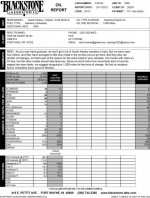Offline
I'd hate to be labeled a science-denier, blasphemer, iconoclast, etc. (and in truth I've already been called all that and worse), but I have to wonder, Does oil selection really make any appreciable difference here? I mean, as long as there's some zinc in it, and considering how little we use these cars and how little we stress them, aren't we talking about hair-splitting, squared?
So maybe the difference is between an engine lasting 250,000 miles or 250,050 miles.
I use Valvoline VR-1 20w50 in most of my olde cars (and Brad Penn Oil in the 914 just because a 914 expert recommended it), and have never had an oil-related problem with any of them over the course of decades. I don't even know of anyone who had an engine problem related to choice of oil. Isn't it true that any modern oil, with some zinc, and of an appropriate viscosity, and changed every so often - 20w50 seems like the universal solution unless maybe you drive your Healey across the polar ice cap or the Sahara - then isn't it really 99.9999 percent all the same?
I used to send in used oil samples for analysis and can't remember ever getting a piece of information that I could act on.
So go ahead and flame away.
So maybe the difference is between an engine lasting 250,000 miles or 250,050 miles.
I use Valvoline VR-1 20w50 in most of my olde cars (and Brad Penn Oil in the 914 just because a 914 expert recommended it), and have never had an oil-related problem with any of them over the course of decades. I don't even know of anyone who had an engine problem related to choice of oil. Isn't it true that any modern oil, with some zinc, and of an appropriate viscosity, and changed every so often - 20w50 seems like the universal solution unless maybe you drive your Healey across the polar ice cap or the Sahara - then isn't it really 99.9999 percent all the same?
I used to send in used oil samples for analysis and can't remember ever getting a piece of information that I could act on.
So go ahead and flame away.

 Hi Guest!
Hi Guest!

 smilie in place of the real @
smilie in place of the real @
 Pretty Please - add it to our Events forum(s) and add to the calendar! >>
Pretty Please - add it to our Events forum(s) and add to the calendar! >> 



